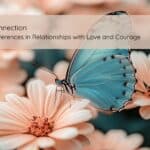“When we choose to love we choose to move against fear—against alienation and separation. The choice to love is a choice to connect—to find ourselves in the other.”
– From Bell Hooks’ All About Love
The Stories We Bring to Our Relationships
 Relationships, whether with family, friends, or partners, invite us into a space of both shared and separate worlds. Each of us brings our own story to a relationship: our experiences, values, views, and beliefs. Our story has been shaped by what we’ve lived through, and parts of this story can be deeply meaningful and foundational to who we are. Sometimes our stories and beliefs overlap with others, which can feel comforting and connecting. Almost always, though, there are parts of our experiences and views that differ with others. When we love someone, we also want them to see the world the way we see it. When someone sees things differently, it can feel unsettling, even threatening. How might we navigate these differences most effectively while also identifying opportunities for support in the midst of challenges?
Relationships, whether with family, friends, or partners, invite us into a space of both shared and separate worlds. Each of us brings our own story to a relationship: our experiences, values, views, and beliefs. Our story has been shaped by what we’ve lived through, and parts of this story can be deeply meaningful and foundational to who we are. Sometimes our stories and beliefs overlap with others, which can feel comforting and connecting. Almost always, though, there are parts of our experiences and views that differ with others. When we love someone, we also want them to see the world the way we see it. When someone sees things differently, it can feel unsettling, even threatening. How might we navigate these differences most effectively while also identifying opportunities for support in the midst of challenges?
Understanding Our Reactions to Difference
Sometimes, hearing another perspective feels like an attack on our own. We might notice ourselves shutting down, withdrawing, or fighting back. These reactions are natural—we are seeking connection and safety with our loved ones, and it can feel like our differences say something about them or about us. We might have fears bubble up in these moments of disagreement: If you don’t agree with me, then how can you see me? How can you accept me for who I am? Can I accept you for who you are? Yet, when we stop at defensiveness, we tend to miss out on something meaningful.
Curiosity as a Bridge
Curiosity offers another path. To be curious about another’s point of view is not to agree, condone, or give up on your story. It’s simply a way of saying: I care enough about this person to want to understand how they see the world.
When we brave difficult conversations with our loved ones, we often gain more than information—we gain connection. We might not come away from the conversation in full agreement, but we can arrive at a greater understanding and sense of compassion for ourselves and others. That building of understanding (maybe not agreeing!) and compassion helps deepen our connection and teach us that we can still hold meaningful relationships even when differences are present.
The Courage to Stay Open
 Holding space for both love and disagreement is an act of courage. It asks us to stay open when our instincts want to close, to listen when we’d rather speak, and to suggest we can find a way forward together.
Holding space for both love and disagreement is an act of courage. It asks us to stay open when our instincts want to close, to listen when we’d rather speak, and to suggest we can find a way forward together.
This isn’t to say we should stay in relationships where our efforts go wholly unreciprocated or where unhealthy patterns persist. Rather, it’s an invitation to reach out and seek connection before deciding to change the form a relationship takes, whether to set boundaries or to end it altogether. There are times when ending a relationship is the healthiest choice, but ideally it’s a choice made after reflection, not in reaction.
Seeking Support When It Feels Overwhelming
It’s so common to feel lost, stuck, or disconnected when navigating differences and disagreements in relationships. When this starts to feel overwhelming, it is important to seek out resources and support to help us regain balance and groundedness rather than attempting to wholly manage the difficulties alone. This could include reaching out to trusted confidants for help or could also mean seeking out guidance from a professional therapist.
Therapy can offer a unique space for exploration of yourself and your relationships—it can help us reconnect with ourselves and others, learn new ways to approach difficult conversations with loved ones, and gain awareness on how we would like to intentionally choose to move forward in our relationships and towards a greater sense of love and connection. Regardless of which challenges we face in our relationships, and the types of support we seek to navigate them, it is so important to clarify with ourselves what we want in our relationships, how we want to show up in them, and how we want to contend with painful conflicts that arise. If we don’t ultimately take steps towards dialogue, understanding, and reconciliation, we close ourselves off to the pursuit of authentic connection.
Interested in Exploring Relationships in Your Life?
Differences don’t have to mean distance. At The Catalyst Center, our therapists help individuals and couples approach conflict with curiosity and compassion. Contact us to start finding your way back to understanding and closeness.
Call schedule a free introductory call or contact us.




